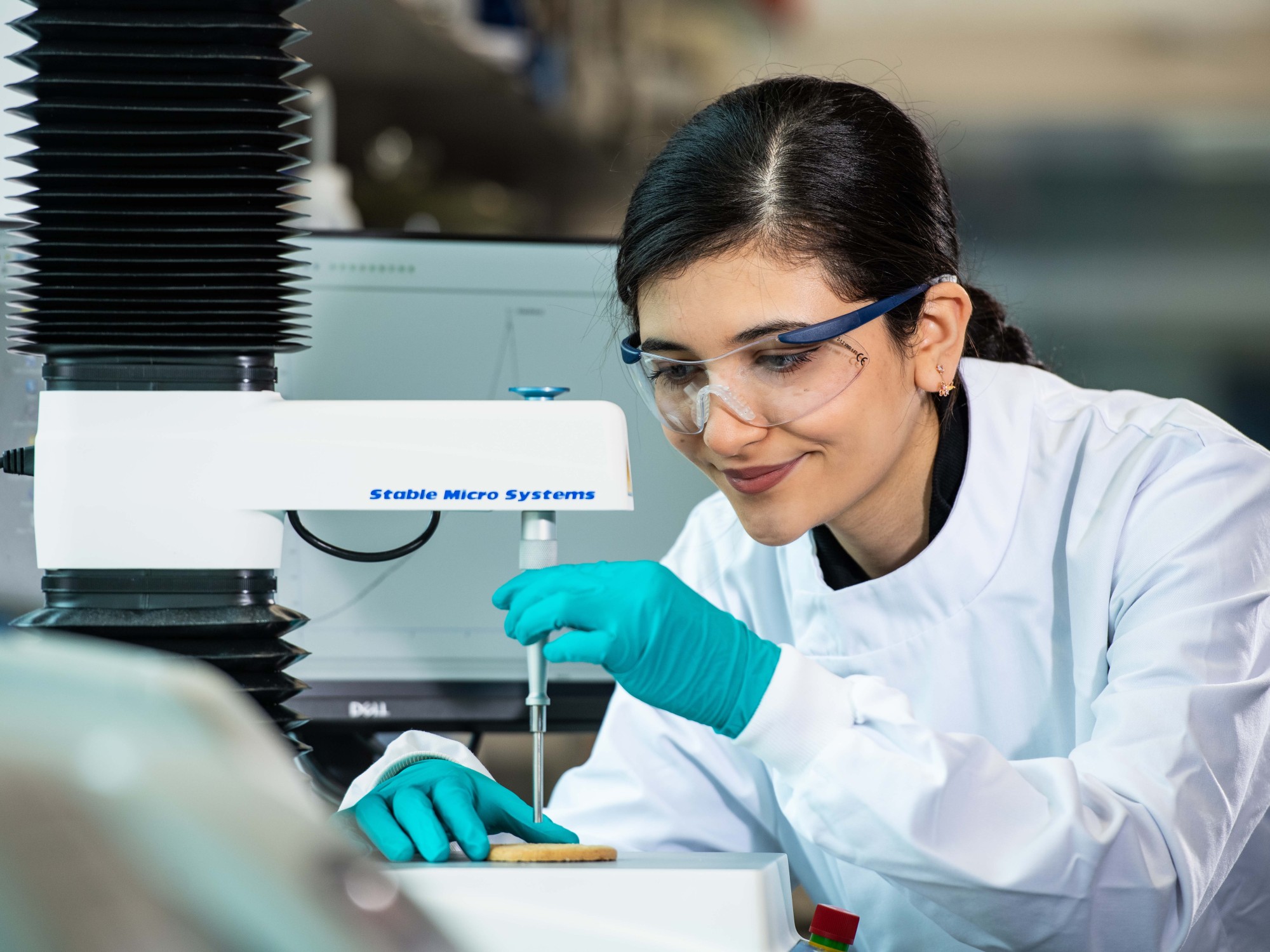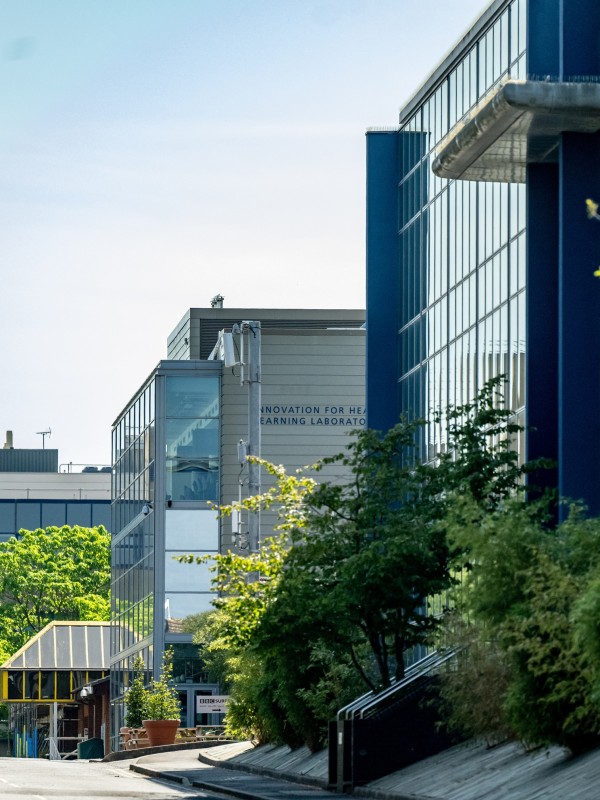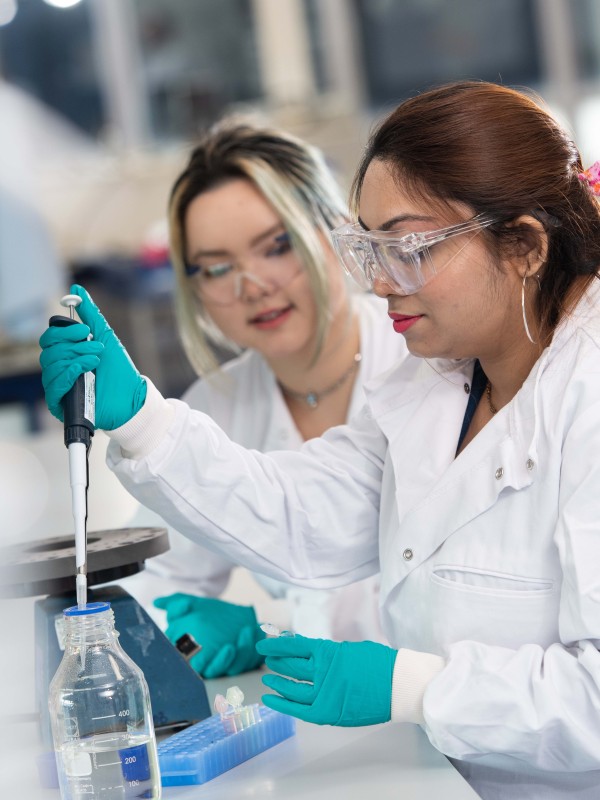
- Food Science
MSc — 2025 entry Food Science
Fuel your interest in food science on this masters course and understand the dramatic implications food science and nutrition can have on human health and disease.
Why choose
this course?
- Access our multimillion-pound laboratories and develop your practical skills using the latest industry equipment.
- Join one of our research groups and benefit from our links with renowned research institutions across the world.
- Learn from leading experts at the frontline of applied research, ensuring everything you learn is relevant and valued by employers. Our lecturers were awarded the Queen’s Anniversary Prize for Further and Higher Education in recognition of their research excellence in the field of food and nutrition.
Statistics
100%
Of our biosciences masters graduates are in employment or further study (Graduate Outcomes 2024, HESA)
12th in the UK
Surrey is ranked 12th in the UK in the Complete University Guide 2025
What you will study
We’ll develop your knowledge, scientific research skills and practical skills to an advanced level, with a focus on new product development, processing, food chemistry, food security and microbiology.
You'll gain a deep understanding of current issues in the field of human nutrition. Our teaching emphasises the evidence-based links between diet, health and disease, supported by a full appreciation for the key nutritional dietary components and the microbial mechanisms involved.
You’ll develop the necessary research skills and industry awareness required to pursue a successful and rewarding career in the growing area of food science.
Research groups
You’ll be invited to join one of our research groups, which include the Section of Metabolic Medicine, Food and Macronutrients, and the Section of Public Health and Food Security. You’ll participate in discussions about research topics, findings and publications, and will also benefit from our links with renowned research institutions across the world. We also have a host of external speakers that visit us and present their work, and a collection of seminars and workshops, allowing you to network with like-minded individuals.
Facilities
As a food science student, you’ll get access to our multimillion-pound laboratories, kitted out with some of the latest equipment. You’ll use this to enhance your investigative and practical skills, which are essential in a research career.
The structure of our programmes follows clear educational aims that are tailored to each programme. These are all outlined in the programme specifications which include further details such as the learning outcomes:
Modules
Modules listed are indicative, reflecting the information available at the time of publication. Modules are subject to teaching availability, student demand and/or class size caps.
The University operates a credit framework for all taught programmes based on a 15-credit tariff, meaning all modules are comprised of multiples of 15 credits, up to a maximum of 120 credits.
Course options
Year 1
Semester 1
Compulsory
This module is designed to equip students with the core knowledge of energy and the nutrients as a foundation to further nutrition modules within the MSc Nutrition programme. It will also develop key academic skills for learning, research and communication at an advanced level.
View full module detailsThis module covers a variety of important components in foods that arise from the chemical and biochemical transformations which occur during the processing, storage and preparation of foods. It builds on previous knowledge in food science in terms of enhancing the understanding of the complex reactions that occur in foods. This will be done by critically examining the published research in the field, which will be helpful for the research project. The emphasis is focused on understanding how the compounds are formed, the levels present and their role in food safety and acceptability.
View full module detailsThis Module provides a broadly-based review of current methods employed in experimental food and nutritional sciences, with hands on practical aspects in statistics, epidemiology, study design, and dietary intake measurements as well as experience in scientific writing and critical reviews. Statistics will be at the level of simple (e.g. descriptives and correlations) and more complex (t-test, Mann Whitney U test, Wilcoxon Matched Pairs, ANOVA, Friedman Test, Repeated Measures ANOVA and Regression). Statistics will be assessed through a piece of coursework analyzing data from a Nutrition & Bone Health dataset from original published papers. These are necessary skills needed for the Research project module (MHUM009) and for preparing scientific manuscripts. The Module will also provide an opportunity to develop professional skills, attributes, and awareness of appropriate conduct/practice crucial to working in the sectors of Food and Nutrition. This module will also help with preparation for employability, including presentations and discussions on career options. Both professional skills and employability will be assessed through a piece of coursework on Case Studies and a digital LinkedIn page. Each Coursework will be worth 50% of the marks.
View full module detailsSemester 2
Compulsory
The purpose of the module is to provide a detailed theoretical knowledge of Food, Water and Soil Security in order to improve the provision of safe food components and commodities that have high nutritional and ecological quality. In this respect, the analysis of foods and farming & processing methods that meet UK and EU Food Legislation and associated guidelines is examined. In addition, this module covers aspects related to Farm Production, Food Fraud and Food Safety, particularly in the area of animal welfare and animal species adulteration. Students will also appreciate the importance of carrying out appropriate risk assessment for further implementation of HACCP and control methods in the food industry. The module comprises lectures, tutorials and assessments that form an essential part of Food Science.
View full module detailsIn this module students will be introduced to the key aspects of the gastrointestinal (GI) system highlighting important features in humans (and where appropriate animals). The module will focus on the anatomy and physiology of the normal GI system covering digestion and absorption as well as the gut microbiome and immunology. It will also cover disorders associated gut diseases including those associated with dysbiosis and investigate the mechanisms of disease and appropriate food/nutrition treatment/functional foods.
View full module detailsThe module develops the students’ understanding as to the translation of nutrition science into population health, policy and guidelines.¿ It gives a global perspective on nutrition related public health issues of current concern, and aims to develop critical thinking and application.¿ The module is taught by a combination of internal and guest lecturers providing insight from a national and international perspective
View full module detailsSemester 1 & 2
Compulsory
This module will harmoniously cover the fundamental topics needed to design a new food product with particular attention to different food technologies (classic and novel processes). Our students will learn about food matrices and ingredients interactions by looking at their technical functions and sustainability aspects (es, which ingredients are sustainable according to the geographical area and, how can we reduce waste. How processes can be tweaked to decrease costs). This module builds up creativity for novel food formulation and research skills. It is interesting to see how this module harmoniously links to MHUM015 regarding research methodologies via our practicals and a lab report (assignment 1). Not only, but this module also relates well with its sister module, MHUM012 where further and in-depth food chemistry mechanisms are explored in semester 1. Food Security is an aspect that permeates this module and is further developed in MHUM010. As functional foods are rising in popularity nowadays, this topic is widely explored throughout the module via lectures and the final assignment. Therefore, BMSM40 is strictly linked and integrated by MHUM016. A student attending BMSM40 will expect to learn about not only ingredients functionalities and trends in food science but will also get an understanding of fundamental principles for food processing. We will highlight the benefits and also potential risks. This will enable our students to design and develop a new product that will be financially and legally viable. Learning is facilitated by the use of discussion sessions, tutorials, and videos.
View full module detailsAcross academic years
Compulsory
This module allows the student to engage in an in-depth major project in an area relevant for nutritional science in the 21st Century. Projects may involve direct data collection, analysis of pre-existing datasets or “big-data”, systematic reviews/meta-analysis or involve writing a research grant application to answer a pertinent nutritional question. Students may be attached to NHS units, to staff or research teams within the Department of Nutritional Sciences, but also in other areas in the wider University, including psychology. Students will be guided to undertake a project in an area of interest or in an area proposed by a University supervisor(s).
View full module detailsTeaching and learning
- Dr Terri Grassby, an expert in carbohydrates, particularly dietary fibre, and their effects on nutrient digestibility
- Dr Jorge Gutierrez-Merino, an expert in food and environmental microbes and the role they play in food safety and the food chain
- Dr Jonathan Brown, an expert in phytonutrients and food bioactive compounds
- Dr Vero Giacintucci, an expert in food product reformulation and new product development
- Dr Bolanle Oloyede, an expert in sensory and consumer science and flavour chemistry.
General course information
Contact hours
Contact hours can vary across our modules. Full details of the contact hours for each module are available from the University of Surrey's module catalogue. See the modules section for more information.
Timetable
Course timetables are normally available one month before the start of the semester.
New students will receive their personalised timetable in Welcome Week, and in subsequent semesters, two weeks prior to the start of semester.
Please note that while we make every effort to ensure that timetables are as student-friendly as possible, scheduled teaching can take place on any day of the week (Monday – Friday). Wednesday afternoons are normally reserved for sports and cultural activities. Part-time classes are normally scheduled on one or two days per week, details of which can be obtained from Academic Administration.
Location
This course is based at Stag Hill campus. Stag Hill is the University's main campus and where the majority of our courses are taught.
We offer careers information, advice and guidance to all students whilst studying with us, which is extended to our alumni for three years after leaving the University.
100% of our biosciences masters graduates are in employment or further study (Graduate Outcomes 2024, HESA). Our graduates often start or continue careers as professionals within the food industry and its associated agencies. They typically take on roles as new product developers, food analysts, regulatory specialists and process technologists. Some also work in quality assurance or progress further in the food and nutrition industry.
Many of our graduates also go on to complete a PhD with us, joining a community of research-active staff and postgraduate researchers.


Suthikshan
Student - Food Science MSc
"The MSc Food Science provides opportunities to work on real-world projects like product development, which was a key highlight for me."


Hannah
Graduate - Food Science MSc
"What truly makes Surrey stand out is its staff – I have never been taught by such supportive, friendly and committed educators who genuinely listen to students and go above and beyond to help them succeed."
UK qualifications
A minimum of a 2:2 UK honours degree in a relevant subject.
English language requirements
IELTS Academic: 6.5 overall with a minimum of 6.0 in each component.
These are the English language qualifications and levels that we can accept.
If you do not currently meet the level required for your programme, we offer intensive pre-sessional English language courses, designed to take you to the level of English ability and skill required for your studies here.


International Pre-Masters
Prepare for postgraduate study and boost your career prospects. This is an intensive programme of academic subjects, study skills and English language preparation designed to help you succeed.
Recognition of prior learning
We recognise that many students enter their course with valuable knowledge and skills developed through a range of ways.
If this applies to you, the recognition of prior learning process may mean you can join a course without the formal entry requirements, or at a point appropriate to your previous learning and experience.
There are restrictions for some courses and fees may be payable for certain claims. Please contact the Admissions team with any queries.
Scholarships and bursaries
Discover what scholarships and bursaries are available to support your studies.
Fees per year
Explore UKCISA’s website for more information if you are unsure whether you are a UK or overseas student. View the list of fees for all postgraduate courses.
September 2025 - Full-time - 1 year
- UK
- £10,900
- Overseas
- £24,900
- These fees apply to students commencing study in the academic year 2025-26 only. Fees for new starters are reviewed annually.
Payment schedule
- Students with Tuition Fee Loan: the Student Loans Company pay fees in line with their schedule (students on an unstructured self-paced part-time course are not eligible for a Tuition Fee Loan).
- Students without a Tuition Fee Loan: pay their fees either in full at the beginning of the programme or in two instalments as follows:
- 50% payable 10 days after the invoice date (expected to be October/November of each academic year)
- 50% in January of the same academic year.
- Students on part-time programmes where fees are paid on a modular basis: cannot pay fees by instalment.
- Sponsored students: must provide us with valid sponsorship information that covers the period of study.
The exact date(s) will be on invoices.
Additional costs
Safety equipment and/or uniform: £24 equipment pack (includes laboratory coat, laboratory glasses, laboratory book, pen and bag). You are responsible for the costs associated with maintaining/washing/replacing any equipment.
For the dissertation/project, students may need to buy food or other things but then they can claim the money back. This is not usually, not large sums. Typically, less than £100.
Funding
You may be able to borrow money to help pay your tuition fees and support you with your living costs. Find out more about postgraduate student finance.
Apply online
To apply online first select the course you'd like to apply for then log in.
Select your course
Choose the course option you wish to apply for.
Sign in
Create an account and sign into our application portal.
Please note that we may have to close applications before the stated deadline if we receive a high volume of suitable applications. We advise you to submit your application as soon as it is ready.
ApplyAdmissions information
Once you apply, you can expect to hear back from us within 14 days. This might be with a decision on your application or with a request for further information.
Our code of practice for postgraduate admissions policy explains how the Admissions team considers applications and admits students. Read our postgraduate applicant guidance for more information on applying.
About the University of Surrey
Need more information?
Contact our Admissions team or talk to a current University of Surrey student online.
Terms and conditions
When you accept an offer to study at the University of Surrey, you are agreeing to follow our policies and procedures, student regulations, and terms and conditions.
We provide these terms and conditions in two stages:
- First when we make an offer.
- Second when students accept their offer and register to study with us (registration terms and conditions will vary depending on your course and academic year).
View our generic registration terms and conditions (PDF) for the 2024/25 academic year, as a guide on what to expect.
Disclaimer
This online prospectus has been published in advance of the academic year to which it applies.
Whilst we have done everything possible to ensure this information is accurate, some changes may happen between publishing and the start of the course.
It is important to check this website for any updates before you apply for a course with us. Read our full disclaimer.










